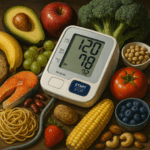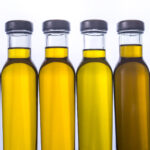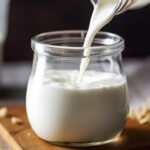Salt has more effect on people with high blood pressure than previously thought. The American Heart Association reports on the randomized trial by researchers of the Vanderbilt University in Nashville, Tennessee. The researchers compared the effects of high-sodium and low-sodium diets on blood pressure in adults with normal blood pressure and high blood pressure. They found that a low-sodium diet significantly lowered blood pressure in 70%-75% of participants in as little as one week. People currently taking blood pressure medications participated in the study as well.
The researchers noted the drop of 7-8 mm Hg systolic blood pressure for participants following a low-sodium diet in comparison to those their usual diet. The average diastolic drop was significant as well, 6 mm Hg.
The researchers achieved this result by reducing sodium intake by around 4,000 mg per day. It significantly lowered systolic blood pressure in more than 70% of adults, ages 50 to 75, in as little as one week compared to their usual diet.
Researchers measured participants’ blood pressure while on their usual diets, then conducted a randomized trial in these same participants to understand how variation in dietary sodium between higher- and lower-sodium intake may relate to changes in blood pressure.
Dr. Deepak K. Gupta, Director of the Vanderbilt Translational and Clinical Cardiovascular Research Center at Vanderbilt University Medical Center, in Nashville, Tennessee, said:
“High blood pressure is the most common chronic disease condition in the world, and for the majority of adults, dietary sodium intake influences blood pressure. However, dietary sodium recommendations are debated in part due to the variability in blood pressure response to sodium consumption from food.”
How it was done
More than 200 adults, ages 50-75 years, from the Coronary Artery Risk Development in Young Adults (CARDIA) participated in the study. Participants were randomized to either a high-sodium diet with 2,200 mg of sodium added to their usual daily diet, or a low-sodium diet with a total of 500 mg sodium daily for one week. The patients in testing were then switched to the opposite diet for one week. Then, their blood pressure was measured over a 24-hour period on the last day of each diet.
Salt and blood pressure study: the results
The main result is that one week of the low-sodium diet significantly lowered systolic blood pressure in nearly 75% of adults. However, further results were achieved:
- The median systolic blood pressure measurements were 125-, 126- and 119-mm Hg for the usual, high- and low-sodium diets, respectively.
- Systolic blood pressure was significantly lowered by 7-8 mm Hg for participants while following the low-sodium diet compared with participants in the high-sodium group and by 6 mm Hg compared with participants following their usual diet. These reductions in systolic blood pressure are comparable to the reductions attained with a common, first-line medication for hypertension.
- The usual diet for most individuals was already very high in sodium at approximately 4,500 mg/day. Participants’ systolic blood pressure was not significantly greater with the high-sodium diet compared with usual diet.
- In contrast, returning to a high-sodium diet did raise blood pressure when starting from the low-sodium reference point.
- The effect of reduction in dietary sodium on blood pressure was consistent across individuals with normal blood pressure, treated high blood pressure, and untreated high blood pressure.
Salt and blood pressure: trial background
In contrast to several of the largest prior studies examining the effect of dietary sodium on blood pressure, the trial included individuals taking medications for high-blood pressure as well as people with diabetes (Type 1 or Type 2 not collected).
At the start of the study, about one-quarter of the 213 participants had normal blood pressure, 20% had controlled high blood pressure, 31% had uncontrolled high blood pressure and the remaining 25% had untreated high blood pressure. Approximately 1 in 5 participants had diabetes.
73% of participants were from the CARDIA study. Other participants were adults in Birmingham, Alabama, and Chicago, Illinois. Participants were ages 50 to 75 years, 65% were women, and 64% were Black adults.
The full manuscript was published in The Journal of the American Medical Association.
The meal plans used in the study
The low-salt diet included food and drinks provided by the researchers and daily meal plans. Sample breakfasts included oatmeal, Greek yogurt and grapes; sample lunches included fruit, a bag of chips and either a chicken salad, lentil soup or peanut butter and jelly sandwich; and sample dinners included fruit, a bottle of 1% low-fat milk and either a low-sodium frozen burrito, low-sodium frozen vegetable lasagna or a low-sodium rice and vegetable entree.
Participants on the high-sodium diet added 2,200 mg of sodium to their regular daily diet — by consuming two chicken bouillon packets daily, with 1,100 mg of sodium each, as provided by the researchers.
The median estimated total daily sodium intake for people on the high-sodium diet was 5,000 mg/day.
People on the low-sodium diet had a median, 24-hour urine sodium level of approximately 1,300 mg, suggesting that some individuals consumed sodium outside of the food and drink provided.
How much salt is enough
The United States Department of Agriculture’s Dietary Guidelines for Americans 2020-2025 recommends adults should consume less than 2,300 mg of sodium daily, however, it’s estimated that adults in the U.S. typically consume about 50% more sodium, or about 3,400 mg/day. The American Heart Association recommends no more than 2,300 mg of sodium/day and moving toward an ideal limit of no more than 1,500 mg/day for most adults.





